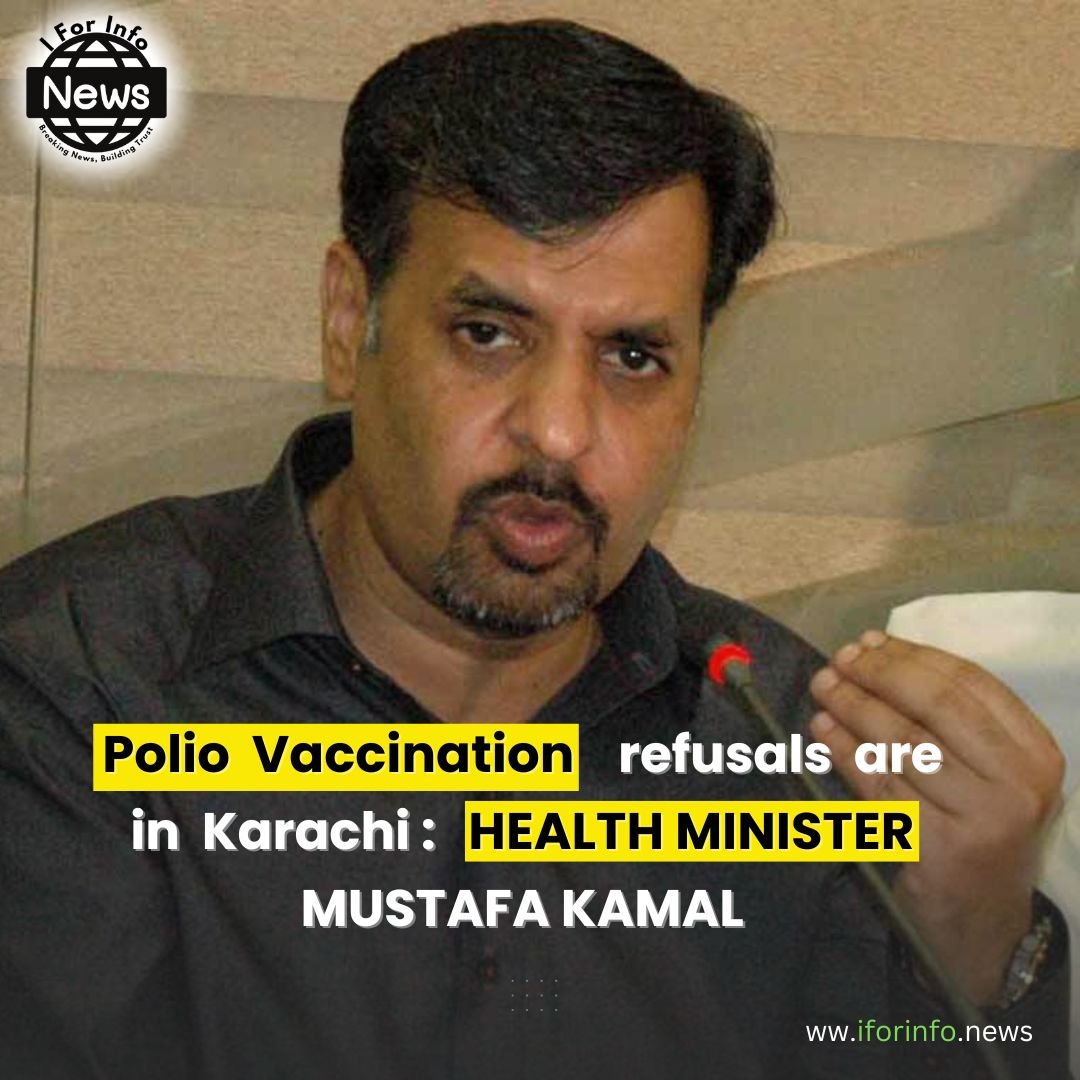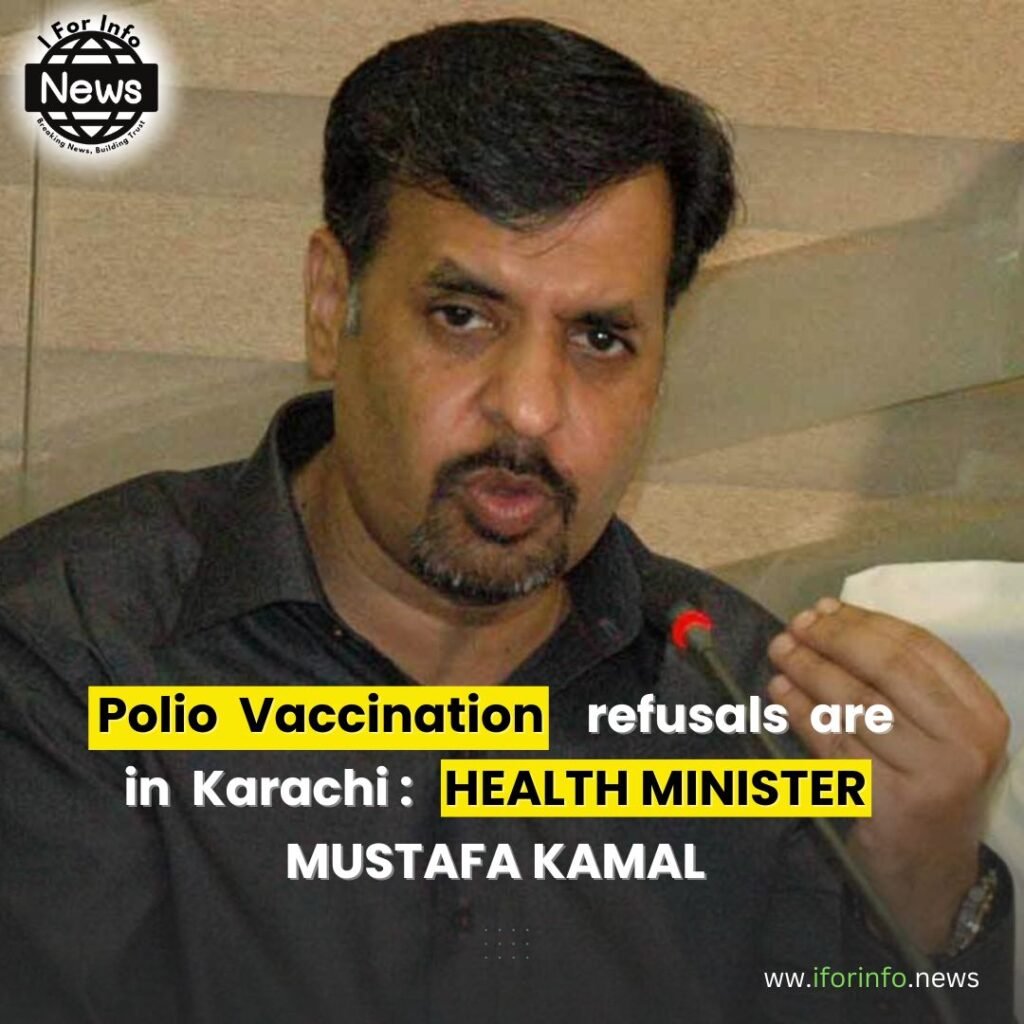85% of Polio Vaccination Refusals Occur in Karachi, Reveals Health Minister Mustafa Kamal
KARACHI:
Federal Health Minister Mustafa Kamal has sounded the alarm over the growing number of polio vaccination refusals in Karachi, stating that an alarming 85% of such cases across the country originate from the metropolis. This revelation underscores the critical challenges facing Pakistan’s fight against polio, particularly in urban areas where misinformation, mistrust, and logistical hurdles continue to hamper eradication efforts.
During a press conference in Islamabad on Friday, Kamal expressed deep concern over the persistent resistance to polio vaccination campaigns, particularly in Karachi’s densely populated localities. “It is unacceptable that the majority of refusals are coming from Karachi—a city with the infrastructure, access, and awareness that should ideally support public health initiatives,” he said.
Polio’s Persistence in Pakistan:
Despite major strides made over the past decade, Pakistan remains one of only two countries in the world—alongside Afghanistan—where the wild poliovirus remains endemic. The disease, which primarily affects children under five, can cause irreversible paralysis and, in severe cases, death.
The government has been running nationwide polio immunization drives with the help of international partners such as the World Health Organization (WHO) and UNICEF. However, progress has been stymied by recurring waves of vaccine refusals and hesitancy, especially in urban hubs like Karachi.
Why Karachi?
Kamal attributed the high rate of refusals in Karachi to a mix of disinformation, cultural taboos, and mistrust in government-backed campaigns. “We are encountering a disturbing trend where communities are being influenced by baseless rumors—that the vaccine causes infertility, that it is part of a foreign agenda, or that it is unsafe,” Kamal explained.
He added that in certain neighborhoods of Karachi—especially those with large migrant populations and underserved communities—resistance to polio vaccines remains dangerously high. “It’s not just a health crisis. It’s also a crisis of trust, misinformation, and lack of education.”
A recent report by the Sindh Health Department revealed that more than 70,000 children in Karachi were missed during the most recent nationwide polio campaign, either because their parents refused vaccination or because families were not available during door-to-door visits.
Community Engagement and Awareness
To address the root causes of the problem, Kamal emphasized the need for stronger community engagement and targeted awareness campaigns. “We need local influencers—religious leaders, school teachers, and community elders—to become ambassadors of this cause,” he said.
The Ministry of Health has announced plans to collaborate with civil society groups and religious scholars to dispel myths surrounding the vaccine. A new media campaign will also be launched across TV, radio, and social media to educate the public about the safety and necessity of polio immunization.
Security Concerns:
Kamal also acknowledged the dangerous working conditions faced by polio workers, especially in areas where anti-vaccine sentiment is strong. There have been multiple incidents in recent years where vaccination teams were attacked or harassed during campaigns.
“We salute the bravery of our frontline workers who continue to risk their lives for the greater good. They are heroes, and it is our responsibility to ensure their protection,” he said. The government has promised to bolster security arrangements for all polio teams during future drives.
Global Implications:
Health experts warn that failure to eradicate polio in Pakistan poses a serious risk to global health. As long as the virus circulates in any part of the world, all countries remain at risk of a resurgence. The Global Polio Eradication Initiative (GPEI) has repeatedly highlighted Karachi as one of the key transmission zones that must be addressed urgently.
WHO Country Representative Dr. Palitha Mahipala has also urged Pakistan to intensify its efforts. “We are close to eliminating polio, but the last mile is always the hardest. Karachi is critical—if we can turn the tide there, we can win the battle nationwide.”
The Way Forward:
Kamal concluded by reaffirming the government’s commitment to eradicating polio. “We will not let decades of progress go to waste. This is a national priority, and we are working day and night to ensure that every child, regardless of where they live, is protected.”
With new initiatives on the horizon and increasing international support, Pakistan still has a chance to end polio for good. But success will depend on one critical factor: overcoming resistance in Karachi, where the stakes—and the risks—are highest.




